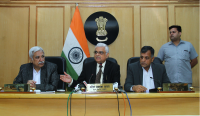
Dated: July 28, 2022
PRESS NOTE
More Opportunities for youth to become part of voters list
Four chances in a year to enrol - need not wait for 1st January qualifying date only
Advance application facility to 17+ year youngsters
New User-friendly forms for voter registration w.e.f 1.8.22
Single Form 8 devised for Correction of entries, if required
Voluntary Aadhar collection to link with Voter card
Focus on removing Demographically/Photo Similar Entries
Commission orders Annual Summary Revision; Pre-revision activity to begin in August
Checking /Supervising to ensure a Healthy Electoral Roll
17+ year old youngsters can now apply in advance for having their names enrolled in Voter’s list and not necessarily have to await the pre-requisite criterion of attaining age of 18 years on 1st January of a year. ECI led by Chief Election Commissioner Shri Rajiv Kumar and Election Commissioner Shri Anup Chandra Pandey have directed the CEOs/EROs/AEROs of all States to work out tech-enabled solutions such that the youth are facilitated to file their advance applications with reference to three subsequent qualifying dates i.e. 01st April, 01st July and 01st October and not just 1st January. Henceforth, the Electoral Roll will be updated every quarter and eligible youngsters can be registered in the next quarter of the year in which he/she has attained the qualifying age of 18 years. After getting registered, he/she will be issued an Electoral Photo Identity Card (EPIC). For the current round of annual revision of electoral roll, 2023, any citizen attaining the age of 18 years by April 1, July 1 and October 1 of 2023 can also submit an advance application for registration as a voter from the date of draft publication of electoral roll.
"In other words, advance application can be submitted on or after 9th November 2022, the date on which draft electoral roll will be published"
The Election Commission of India, in pursuance of the legal amendments in the Section 14(b) of the RP Act 1950 and consequent modifications in Registration of Electors Rules, 1960, has initiated the process for bringing about necessary changes for preparation/revision of electoral roll of Assembly/Parliamentary Constituency. It may be recalled that on the recommendations of ECI, the Ministry of Law & Justice recently amended the RP Act to provide for four qualifying dates i.e., 01st January, 01st April, 01st July and 01st October as eligibility for youngsters to register in electoral rolls as opposed to the earlier single qualifying date of 1st January only.
As per existing policy, revision of electoral rolls with reference to 1st January of the coming year as the qualifying date was done normally in the later part of each year in all States/UTs (normally in the last quarter of a year) so that final publication of the electoral rolls is made in the first week of January of the succeeding year. This meant that a large number of young persons who completed 18 years after 1st January had to wait for Special Summary Revision of the next year for enrolment and were not able to participate in elections held in the intervening period. The Commission has also made the registration Forms more user friendly and simpler. The newly modified Forms will come into force on 1st August, 2022. All applications (claims and objections), in old forms, received before 1st August, 2022 will be processed and disposed of and in such cases, there is no need to file application in new forms.
The Commission has ordered Annual Summary Revision with reference to 01.01.2023 as the qualifying date in all States except the Poll Going States. All the pre-revision activities are undertaken in accordance with the Commission’s existing instructions and guidelines and Manual on Electoral Roll, 2016 and Manual on Polling Stations, 2020. The revision and prerevision activities are done in such a manner that the Electoral Rolls are finally published much before National Voters’ Day (25th January of every year) so that EPICs generated for new electors especially young voters (18-19 years) can be distributed to them in ceremonial manner on the day of NVD.
Pre-revision activities include Rationalization/Re-arrangement of Polling Stations; Removal of discrepancies of Demographically/Photo Similar Entries; Preparation of Supplements and integrated draft roll with reference to 01.01.2023 as the qualifying date. Commission has directed to take all efforts to ensure 100% removal of DSEs/PSEs from electoral roll and discrepancies in EPICs during the current round of pre-revision activities.
The revision activities to begin in November include disposal of claims and objections received after publication of integrated draft electoral roll. Under the Special Summary Revision, a one-month period is available to file claims and objections in the draft electoral roll. Special camps will be organized by CEOs on weekends for which the date will be publicized by concerned CEOs. The final electoral roll will be published on 5th January 2023.
Polling Station Rationalization
As part of the Annual Summary Revision, polling stations, having more than 1500 electors, shall be rationalized/modified as per the given schedule and before the draft publication of electoral rolls in accordance with instructions contained in Manual on Polling Station, 2020. A new Polling Station shall be created only after rationalizing the sections to the adjacent Polling Stations to the possible extent. Other objectives of rationalization of polling stations are to group all the family members and neighbors in a section.
EPIC-AADHAR linking
For linking of AADHAR number with Electoral Roll data, provision has been made in the modified registration forms to seek Aadhaar details of electors. A new Form-6B has also been introduced for collecting Aadhaar number of existing electors. However, no application for inclusion of name in electoral roll shall be denied and no entries in electoral roll shall be deleted for inability of an individual to furnish or intimate Aadhaar Number.
It has been emphasized that while handling Aadhaar number of the applicants, the provision under Section 37 of the Aadhaar (Targeted Delivery of Financial and other Subsidies, Benefits and Services) Act, 2016 must be adhered to. Under no circumstances should it go public. If the electors’ information is required to put for public display, the Aadhaar details must be removed or masked.
A Time bound drive is being started w.e.f. 01.8.22 for collection of Aadhaar number of the existing electors. Furnishing of Aadhaar number is purely voluntary. Objective of the programme is to establish the identity of electors and authentication of entries in Electoral Roll
Deleting Repeat/Multiple Entries from Electoral Roll
Detailed Procedure of Deletion of Repeat/Multiple Entries has been specified. In repeated/multiple entries reported by individual citizens, BLAs of political parties or RWA representatives, field verification is mandatorily done in each and every case. Name of the elector would be deleted in the electoral roll only at the place where he/she is not found to be ordinarily residing.
Field Verifications and Super checking for Healthy Electoral Roll
For the purpose of improving the health of the electoral roll, the Election Commission has emphasized the need for field verification by the Booth Level Officers. There is a mechanism for supervision and checking for enforcing strict accountability of the work performed by different levels of electoral machinery, such as Supervisors, EROs and AEROs by field verification. Similarly, DEOs, Roll Observers and CEOs also check the work done by EROs before the final decision on claims and objections is taken. Besides, Officers from ECI and O/o CEOs are also deployed to further random checks and to supervise.
Participative Process- Involving BLAs
With a view to ensure more involvement of political parties, the Commission has allowed Booth Level Agents (BLAs) of recognized political parties to file applications in bulk, subject to the condition that a BLA shall not submit more than 10 Forms to BLO at one time/in one day. If a BLA files more than 30 Applications/Forms during the entire period of filing claims and objections, then the cross verification must be done by ERO/AERO themselves. Further, the BLA will also submit a list of application forms with a declaration that he has personally verified the particulars of the application forms and is satisfied that they are correct.
PN. Hindi version.pdf PN 64_UPDATED.pdf
- Read more...
-
- 0 comments
- 2,242 views



